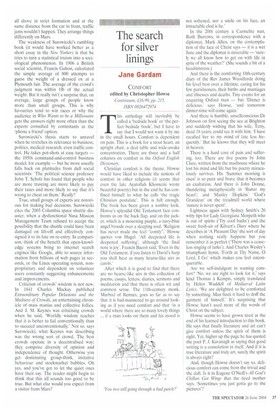The search for silver linings
Jane Gardam
COMFORT edited by Christopher Howse Continuum, 1:16.99, pp. 215, ISBN 0826472974 This anthology will inevitably be called a 'bedside book' or 'the perfect bedside book', but I have to say that I would not want it by me in the small hours. Comfort is dependent on pain. This is a book for a stout heart, an upright chair, a deal table and wide-awake concentration, There are three and a half columns on comfort in the akford English Dictionary.
Christian comfort is the theme. Howse would have liked to include the notions of comfort in other religions (it seems that even the late Ayatollah Khomeini wrote beautiful poetry) but in the end he has confined himself to what he calls 'the tragic Christian postulate'. This is full enough. The book has been given a sombre look. Howse's splendid Old Testament face confronts us on the back flap, and on the jacket, which is a mourning purple, a navy-blue angel broods over a sleeping soul. 'Religion has never made me feel "comfy",' Howse quotes von Hugel. 'All deepened life is deepened suffering', although the final note is joy'. Francis Bacon said, 'Even in the Old Testament, if you listen to David's harp you shall hear as many hearse-like airs as carols,' After which it is good to find that there are no hearse-like airs in this collection of poems, essays, letters, diaries, sermons and meditation and that there is often wit and common sense. The 11th-century monk, Marbod of Rennes, goes so far as to say that it is bad-mannered to go around looking as if you need comfort and that 'in a world where there are so many lovely things ... if a man looks on them and his mood is not softened, nor a smile on his face, an intractable clod is he.'
In the 20th century a Carmelite nun, Ruth Burrows, in correspondence with a diplomat, Mark Allen, on the contemplation of the face of Christ says — it is a wet June and the diplomat is miserable — 'surely we all know how to get on with life in spite of the weather?' (She sounds a bit of a headmistress.)
And there is the comforting 18th-century diary of the Rev James Woodforde doing his level best over a lifetime, caring for his few parishioners, their births and marriages and illnesses and deaths. Tiny events for an enquiring Oxford man — but 'Dinner is delicious.' says Howse, and tomorrow dinner-time will come again.'
And there is humble, unselfconscious Dr Johnson on first seeing the sea at Brighton and suddenly wishing that his wife, Tetty, dead 18 years, could see it with him. 'I have recalled her to my mind of late less frequently.' But he knows that they will meet in heaven.
There is a hard core of pain and suffering, too. There are five poems by John Clare, written from the madhouse where he lost his mind and life but his poetry miraculously survives. His 'Summer morning is risen' is so pure and brave that it becomes an exaltation. And there is John Donne, thundering metaphysically in 'Batter my heart'; and Manley Hopkins' God's Grandeur' on the treadmill world where 'nature is never spent'.
Lightness again with Sydney Smith's 20 witty tips for Lady Georgiana Morpeth who is out of spirits (Try cool baths') and the sweet fresh-air of Kilvert's Diary where he describes in 'A Pleasant Day' the sort of day when nothing really happens but you remember it as perfect (There was a ceaseless singing of larks'). And Charles Wesley's triumphant hymn, 'Forth in Thy Name, 0 Lord, I Go' which makes you feel unconquerable.
Are we self-indulgent in wanting comfort? 'No, we are right to look for it,' says kind Thomas a Kempis, simply translated by Helen Waddell of Mediaeval Latin Lyrics. We are delighted to be comforted by something. Man finds it hard to doff the garment of himself.' It's surprising that Howse hasn't used more of the words of Christ on the subject.
Howse seems to have grown tired at the end of his learned introduction to this book. He says that finally literature and art can't give comfort unless the spirit of them is right. Yet, higher up the page he has quoted the poet P. J. Kavanagh as saying that good writing is a consolation in itself. And if it is true literature and truly art, surely the spirit is always right?
And, though Howse doesn't say so, delicious comfort can come from the trivial and the daft. Is it in Eugene O'Neill's All God's Chaim Got Wings that the tired mother says, 'Sometimes you just gotta go to the pictures'?


































































 Previous page
Previous page